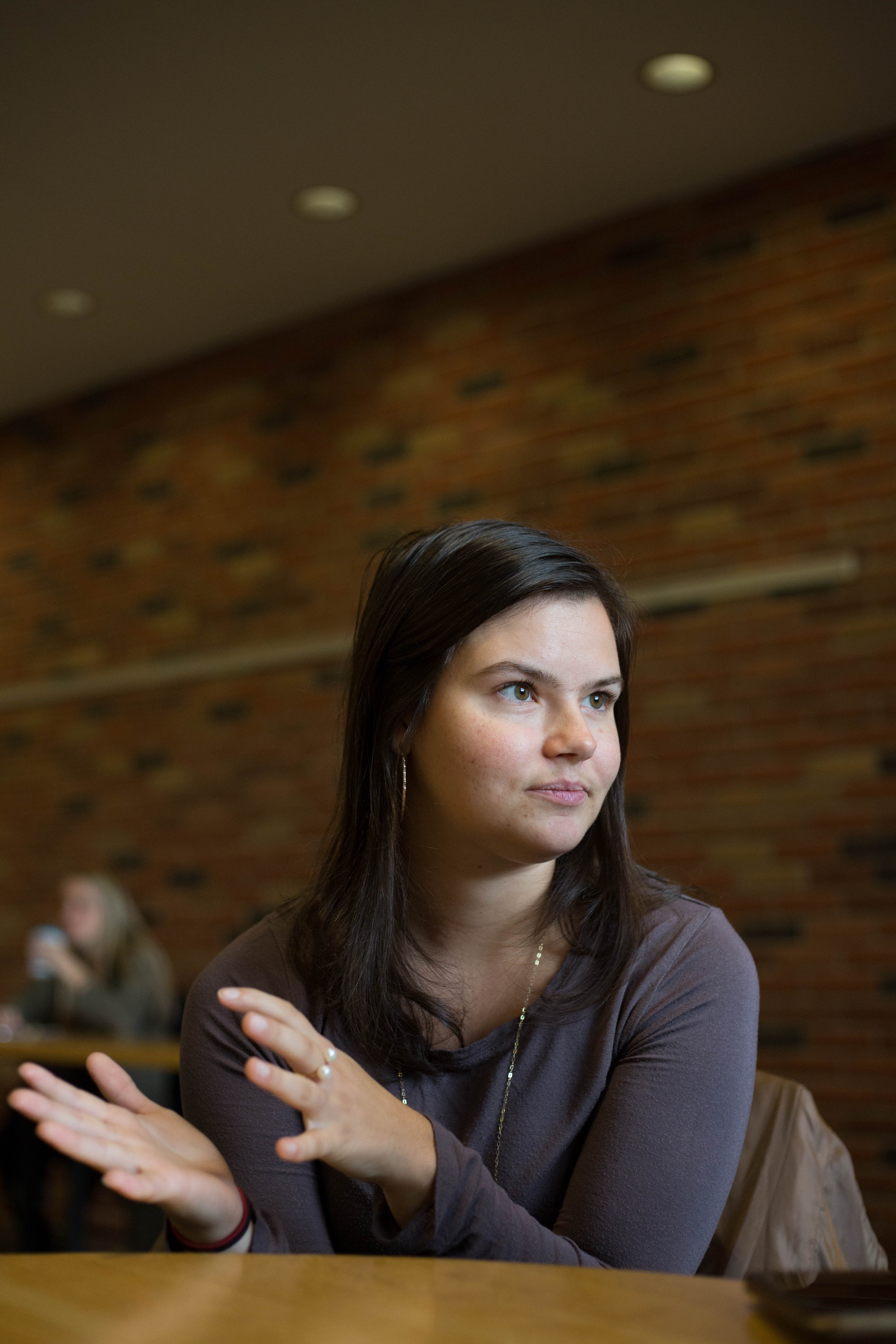Bethel University’s budget shortfall shook the entire community this September.
By Maddie DeBilzan and Jasmine Johnson
The afternoon of Sept. 17 was rainy, and inside Bethel University, the mood echoed the weather. Professors asked for prayer from students after class. Bethel University faculty members wore black.
Five days earlier, at 9:34 a.m., Bethel faculty and staff received an email from Bethel University President Jay Barnes confirming the murmurs in the hallways.
“On Monday, September 17, we will notify individual CAS faculty whose positions have been eliminated due to changes or eliminations of programs,” the email said. “The remaining personnel changes related to this summer’s working groups will be communicated to relevant areas and specific faculty and staff by September 21.”
The email didn’t come as a surprise to faculty and staff. An announcement about the budget shortfall was announced Jan. 17, and 10 staff positions were cut May 1.
But three days after that bleak Monday when professors wore black and students weren’t sure why, a 2:24 p.m. email from Barnes popped up in every student’s inbox.
It was another stormy day, and thunder roared outside while students hunched over their laptops and read the news aloud to each other.
Five years ago, Bethel programs such as Anthropology, Health and Physical Education, French and Exercise Science were truncated. On Thursday, Sept. 20, another rubber band broke.

This year’s cuts
Theatre, physical education, health education, media production, sociology and independent filmmaking majors will no longer be options for incoming students, the email said. The film studies minor will also be discontinued, and the reconciliation studies program will be moved to the Department of Social Work. Some majors that have been discontinued will still be offered as minors.
When the email came in, Bethel University started buzzing. Professors seemed on-edge. Some students within the affected majors had puffy eyes and gathered in private small groups throughout the campus. Others looked angry that their department will no longer live past their graduation date.
This is the second time history professor and Faculty Senate President Chris Gehrz will witness CAS faculty cuts since starting at Bethel 15 years ago. As a senate leader, Gehrz had to figure out, in a committee, where to recommend budget cuts of at least $750,000 from CAS academic programs and submit his findings to the President’s Cabinet. Another $100,000 beyond that had to be included to give the cabinet members some flexibility in their final decisions. The final decision, though, would be made by administration and the Board of Trustees.
The President’s Cabinet took recommendations by Aug. 1 from faculty senate members and other cost analysis groups for possible cuts.
Gehrz said the faculty senate team met twice a week for three hour sessions and held a few all-day meetings throughout June and July leading up to this deadline.
“This summer felt like a failure before it even started,” Gehrz said.
Since he assisted in the brainstorming process and still had to wait for the results, Gehrz expressed the inescapable pressure brought on by this budget cut.
“I’m off to teach the Cold War, which is not a cheery topic, but the idea of spending 75 minutes with students is wonderful,” Gehrz said. “Because then all of this angst and anxiety falls to the side, and I just get to do what I’m meant to do.”
Some CAS faculty and staff wore black Sept. 17 to both mourn and stand in solidarity with each other during the cuts. English professor Mark Bruce wore black for his colleagues who stood the risk of being let go.
“It’s about the people who are going to have a terrible day today,” Bruce said.
That’s the sentiment echoed from most classrooms and offices: the weight of position elimination announcements was a heavy burden to bear. “It’s affecting us all in some way,” theology professor Victor Ezigbo, who also wore black, said. “Our colleagues and friends are being affected.”
Dean of Campus Ministries Laurel Bunker is right with the rest of the university. She said it’s painful for everyone when members of the community are asked to leave.
“They’re not invisible to us,” Bunker said. “Bethel is a place they’ve dug deep roots. They don’t owe anyone easy answers or smiling faces.”

What’s causing the shortfall?
Regardless of the pressure the budget crunch places on CAS faculty and staff, something had to be done about Bethel’s enrollment drop, Bethel Provost Deb Harless said. The drop in Bethel’s enrollment was never “catastrophic,” she said, but the change was enough to put the university in a tough position.
Bethel’s total enrollment has decreased by 744 students in the past five years.
Since 2008, Seminary enrollment has halved, the College of Adult and Professional Studies enrollment has gone down 33 percent, and the College of Art and Sciences enrollment has shrunk by 12 percent.
Bethel isn’t alone in its financial struggle. According to the National Center for Education Statistics, U.S. college enrollment decreased by 7 percent between 2010 and 2016.
Harless said Bethel’s budget problems are a direct result of the slow decline in undergraduate enrollment that’s rippling across the country. That’s in part because there are less students graduating from high school in general. But the budget is also suffering because the financial aid that Bethel gives students is increasing.
Pat Brooke, Bethel University’s Chief Financial Officer, said private universities across the country are being affected by competitors that offer a more affordable education, such as the University of Phoenix, DeVry University, and nanodegree programs now being offered by companies such as Microsoft and Google.
In short, Bethel needs more students to enroll in order to have a sustainable income from tuition dollars. But in order to get students to attend an expensive Christian liberal arts school amidst rising tuition costs, they are forced to give out more financial aid.
Harless said although the budget shortfall has been hard for her and the entire community, she believes there are good things to come. She said a group has formed to work on innovative ways to create revenue streams.
“They’ve got some really exciting ideas,” she said.
Those projects will be released in November
And although the cabinet and recommendation groups were forced to choose between multiple negative solutions when deciding where to cut faculty, staff and programs, Harless believes they made the best decisions possible.
“We put a process in place, and I believe it’s a really good process,” she said.

Mourning and confusion
Students who are already enrolled in one of the affected majors will be able to finish their degrees at Bethel in a “teach-out” program.
But students and professors have expressed confusion about the future of their affected programs.
“I think the cuts just show that Bethel has set its focus on the majors such as business and nursing,” Beau Smith, a media production major, said.
Lisa Kemple, instructor of health education, will not be returning to Bethel next year. She said she was surprised to hear the news, and that she isn’t sure who will teach the students who need to finish their health education major at Bethel.
Student body president Kennadie Anderson acknowledged Bethel’s financial position and the program cuts in an email response to the Clarion:
“We are clearly encountering a financially challenging time as a university,” she wrote. “As a student, I am of course saddened by necessary cuts, yet I trust the discernment of administration as they lead us forward.”
The theatre department is especially upset about the changes.
Freshman theatre student Kyle Doherty, who enrolled in Bethel because of its theatre and choir programs, expressed his frustration of losing the opportunity to perform in any productions his senior year.
“It’s sad to me that people coming in won’t be able to experience that in full,” Doherty said. “It’s been a growing passion of mine and I’m just really upset about it.”
Hank Olson, a theatre major and the student leader of Intelephant, the improvisation group on campus, also expressed frustration at the announcement of the changes.
“The theatre department is all about relationships and care, and I feel like none of that was taken into consideration,” he said. He said he and fellow theatre majors are full of grief and mourning as the realization sets in that the theatre department will soon be phased out.
Olson also said he feels that the people interested in theatre at Bethel have been underrepresented because more than 40 students are usually involved in each production — which is a lot more than what the narrow list of theatre majors actually shows
Theatre department chair and associate professor Meg Zauner said that the loss of the theatre program was both shocking and short-sighted.
“How is it that we’re a liberal arts university and we lose one of the arts?” she said.
The theatre department proposed to save up to $100,000 annually and said it would continue to create revenue through their four productions every year. The proposal efforts failed.
Senior independent filmmaking student Emily Lewis was upset about the effects these cuts will have on the university, but encouraged the community to embrace the changes and support one another through this time.
“In the coming weeks, I think we all — students, faculty, staff alike — (should) just be really conscious of those who are really upset, or those who were cut, or those who are struggling to reconcile,” Lewis said.
Additional reporting by Maddie Christy, Emma Melling, Elena Vaughn, Diana Clark, Lindsey Micucci, Jared Martinson, Jaimee Hood, Laura Osterlund and Judd Martinson.

![Nelson Hall Resident Director Kendall Engelke Davis looks over to see what Resident Assistant Chloe Smith paints. For her weekly 8 p.m. staff development meeting in Nelson Shack April 16, Engelke Davis held a watercolor event to relieve stress. “It’s a unique opportunity to get to really invest and be in [RAs’] lives,” Engelke Davis said, “which I consider such a privilege.”](http://thebuclarion.com/wp-content/uploads/2024/05/041624_KendallEngelkeDavis_Holland_05-1200x800.jpg)














